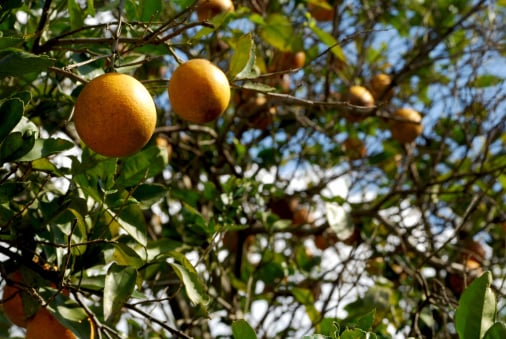Total U.S. production of oranges in the 2013–2014 crop year is now estimated at about 7.2 million tons, more than a million tons below last year’s total of 8.3 million tons. Virtually the entire decrease is attributable to a drop in production from Florida. Source: Thinkstock
Source: Thinkstock
The U.S. Department of Agriculture (USDA) released its monthly crop production report on Wednesday and forecast Florida production at 110 million 90-pound boxes for the crop year ending in September. According to The Wall Street Journal, that is down 12% from the USDA’s original estimate and the smallest crop since the 1984–1985 crop year.
The decline is due to an outbreak of a disease known as citrus greening. Officially known as Huanglongbing (HLB) was first reported in Florida in 2005. The bacterium causes trees to produce less and smaller, more bitter fruit. After a few years HLB kills the trees. According to a recent report in the Washington Post, about half the trees in every citrus orchard in Florida are affected by the incurable disease.
Since late October orange juice prices have climbed from around $1.20 a pound to more than $1.60 a pound. The only thing keeping prices from rising more is lower demand. Orange juice sales fell 5.3% in the four-week period ending March 15, according to the Wall Street Journal.
Orange groves in California, Georgia, Louisiana and Texas have also been hit by HLB, as have orchards in many other parts of the world, including Brazil, which supplies about 20% of the U.S. demand for orange juice.
U.S. consumers are paying more for beef and pork already. Rising prices for orange juice will only put more pressure on household budgets.
Orange juice for May delivery traded Thursday at $1.6345 a pound.
Sponsored: Find a Qualified Financial Advisor
Finding a qualified financial advisor doesn’t have to be hard. SmartAsset’s free tool matches you with up to 3 fiduciary financial advisors in your area in 5 minutes. Each advisor has been vetted by SmartAsset and is held to a fiduciary standard to act in your best interests. If you’re ready to be matched with local advisors that can help you achieve your financial goals, get started now.
Thank you for reading! Have some feedback for us?
Contact the 24/7 Wall St. editorial team.



